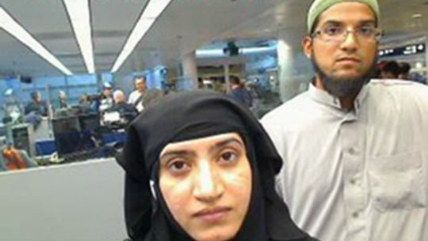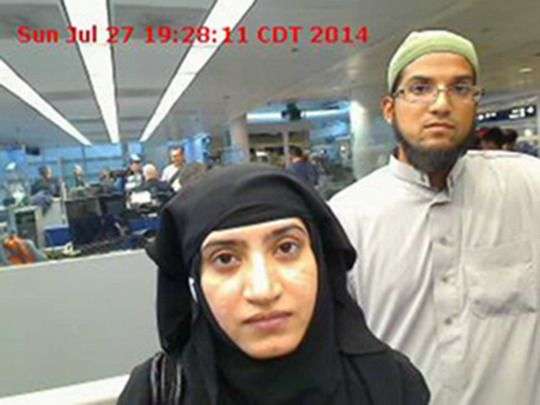Secret Watchlists and Body Searches: Yes. Social Media Post Reviews: No. Our DHS in Action.
Baffling contradictions about privacy or just old-fashioned blame-shifting?


So the federal government will place people on watchlists and no-fly lists with no real due process and make travel extremely difficult, if not impossible, for people it suspects may be plotting some act of terrorism. Or knows somebody who is. Or has the same name as somebody who is. Or if somebody checks the wrong box. And the federal government will fondle you and your children and your elderly grandparents to make sure you're not going to bring something dangerous onto a plane.
But looking at public social media posts for people seeking visas to enter the United States. Why, that's beyond the pale!
We now know that Tashfeen Malik, the female half of the couple responsible for the terrorist attack in San Bernardino that killed 14, had apparently openly discussed her desire to engage in violence against the United States on Facebook years ago. But these posts were not found by authorities until after the couple's violence. Malik was apparently already intending violence before she came to the United States.
So now the focus is on how Malik could have possibly been allowed into the United States. Why weren't her social media posts part of the routine analysis of her background check for her visa? According to ABC News, it's because the Department of Homeland Security (DHS) was afraid of bad publicity. No, really:
Fearing a civil liberties backlash and "bad public relations" for the Obama administration, Homeland Security Secretary Jeh Johnson refused in early 2014 to end a secret U.S. policy that prohibited immigration officials from reviewing the social media messages of all foreign citizens applying for U.S. visas, a former senior department official said.
"During that time period immigration officials were not allowed to use or review social media as part of the screening process," John Cohen, a former acting under-secretary at DHS for intelligence and analysis. Cohen is now a national security consultant for ABC News.
Apparently the DHS Office of Civil Liberties and the Office of Privacy (count me amazed that these two offices actually exist given how citizens are treated) had issues:
"The primary concern was that it would be viewed negatively if it was disclosed publicly and there were concerns that it would be embarrassing," Cohen said in an interview broadcast on "Good Morning America" today.
Cohen said he and others were deeply disappointed that the senior leadership would not approve a review of what were publicly-posted online messages.
"There is no excuse for not using every resource at our disposal to fully vet individuals before they come to the United States," Cohen said.
There is a "blame Snowden" dimension that we should be very reluctant to treat with any sort of credibility:
Cohen said the disclosures by Edward Snowden about National Security Agency (NSA) surveillance policies fed concern of bad public relations that would affect the U.S. government's standing with civil rights groups and European allies.
"It was primarily a question of optics," said Cohen. "There were concerns from a privacy and civil liberties perspective that while this was not illegal, that it would be viewed negatively if it was disclosed publicly."
This has the stench of a straw man (and bureaucratic ass-covering). The outrage from Snowden's revelations, at least for most of the public, has been entirely over the collection of information by and about American citizens. There's been very little evidence that Americans believe that their own government should treat foreigners or potential visitors to the United States with the same expectations of privacy that it does citizens.
Certainly there are ways that government officials can violate the privacy of people on social media, like by making fake identities or posing as other people to try to "friend" others in order to see online posts that aren't public. And in this case, Malik was apparently using a pseudonym. She still might not have been found.
But that's not what's being argued here. Who exactly has argued that the federal government can't look at public social media posts of foreign travelers or potential immigrants? Even within the United States, law enforcement agencies troll social media looking for illegal rave parties and similar activities. This seems more like a branch of the federal government was unable to put appropriate policies into place and now wants to blame outside activists for its failures.


Show Comments (53)